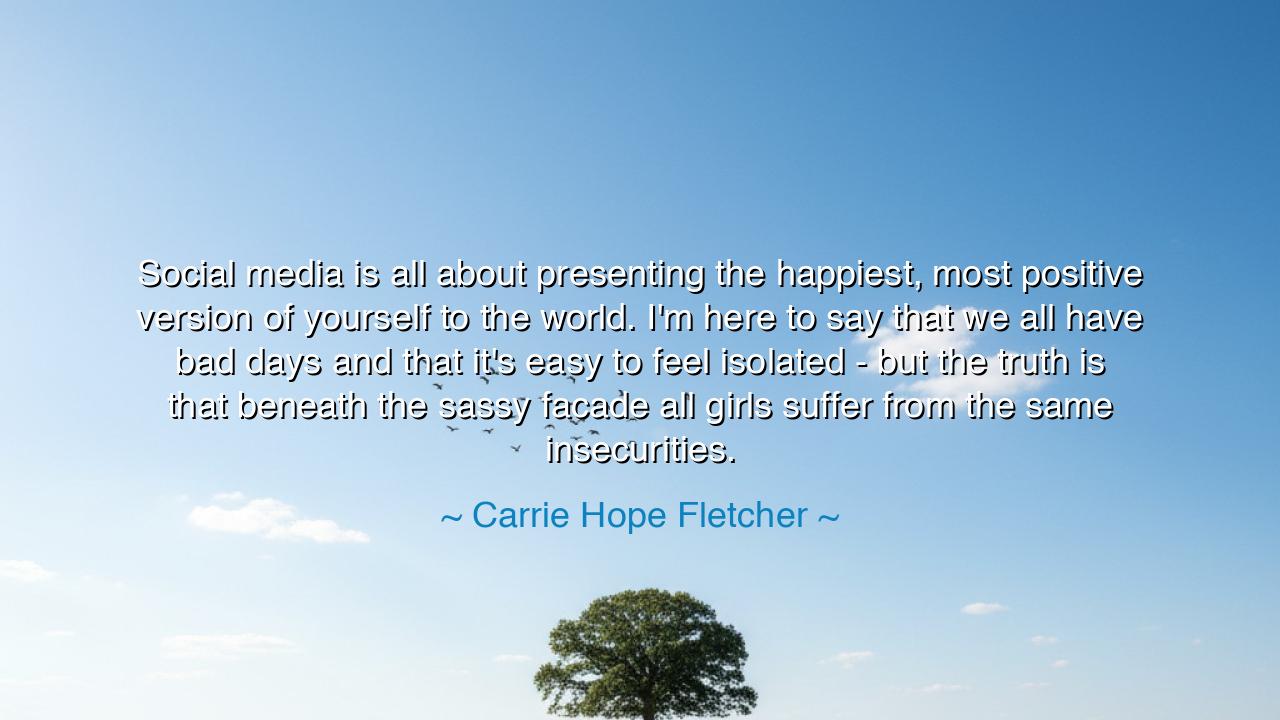
Social media is all about presenting the happiest, most positive
Social media is all about presenting the happiest, most positive version of yourself to the world. I'm here to say that we all have bad days and that it's easy to feel isolated - but the truth is that beneath the sassy facade all girls suffer from the same insecurities.






The words of Carrie Hope Fletcher—“Social media is all about presenting the happiest, most positive version of yourself to the world. I'm here to say that we all have bad days and that it's easy to feel isolated - but the truth is that beneath the sassy facade all girls suffer from the same insecurities.”—are like a veil being torn from the face of illusion. In them, she unmasks the shimmering world of social media, where smiles are constant, days are always golden, and perfection seems to be the only currency of worth. She warns us that what appears to be joy may hide sorrow, and that behind confidence often lurks doubt. In her words is a call to honesty: that truth is not always pretty, but it is liberating.
The origin of this reflection lies in the age of digital masks, where images and captions are carefully crafted to show life not as it is, but as it is desired to be seen. Fletcher, an actress and writer, knew firsthand how heavy the weight of appearances can become. For women in particular, there is constant pressure to appear flawless—glowing skin, perfect hair, unshakable confidence. Yet she boldly confessed that beneath the facade of sass and laughter, the heart still trembles with the same ancient insecurities of not being enough, not being loved, not being worthy. Her courage to speak this truth is itself an act of rebellion against the tyranny of appearances.
The ancients too knew this struggle, though they had no screens to scroll. In Greece and Rome, statues of gods and heroes showed only idealized bodies, never the flaws of ordinary flesh. Citizens looked upon them and felt their own imperfections more sharply. Just as today’s youth compare themselves to images online, so did the ancients compare themselves to marble perfection. Yet the philosophers counseled otherwise: Epictetus taught that beauty lies in virtue, not in form. Fletcher’s words echo this wisdom: the truth of worth lies not in the mask of perfection, but in the shared humanity of imperfection.
History provides us with striking lessons. Consider Princess Diana, who to the world seemed radiant, elegant, and adored. Photographs showed a fairy-tale figure. Yet in her own words she revealed her struggles with loneliness, insecurity, and sorrow. The public facade was glorious, but the hidden truth was one of vulnerability. When she spoke openly about her pain, millions around the world felt a deep connection, realizing that even those who appear perfect wrestle with the same shadows. Fletcher’s declaration belongs to this lineage: honesty creates solidarity, and solidarity destroys isolation.
The danger of social media illusions is that they create isolation. When we believe that everyone else is endlessly happy, our own struggles feel like failure. We retreat into silence, ashamed of our humanity. Fletcher reminds us that this silence is a lie. The truth is that everyone has bad days, everyone carries hidden insecurities, everyone feels fragile at times. By admitting this, she breaks the false wall between people and calls us back into fellowship, where weakness is not shame but shared humanity.
The lesson for us is powerful: do not measure yourself against the polished illusions of others. Do not let the smiles on the screen convince you that you alone suffer. Instead, remember that even beneath the brightest facades, hearts beat with the same doubts as yours. To share honestly, to admit pain, to confess fear—these acts do not diminish us, they unite us. They remind us that no one walks through life free of struggle.
Therefore, take these actions: when you speak, dare to be honest, not only polished. When you post, let truth mingle with joy, so others may see both light and shadow. When you look upon the shining images of others, remember Fletcher’s wisdom: beneath the facade, all carry insecurities. Do not despair in your struggles; instead, let them bind you closer to others. For in the end, truth—not appearance—frees us from loneliness and teaches us what it means to be human.






AAdministratorAdministrator
Welcome, honored guests. Please leave a comment, we will respond soon